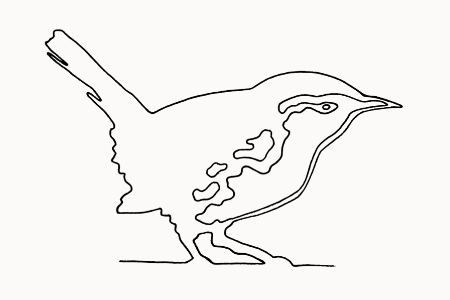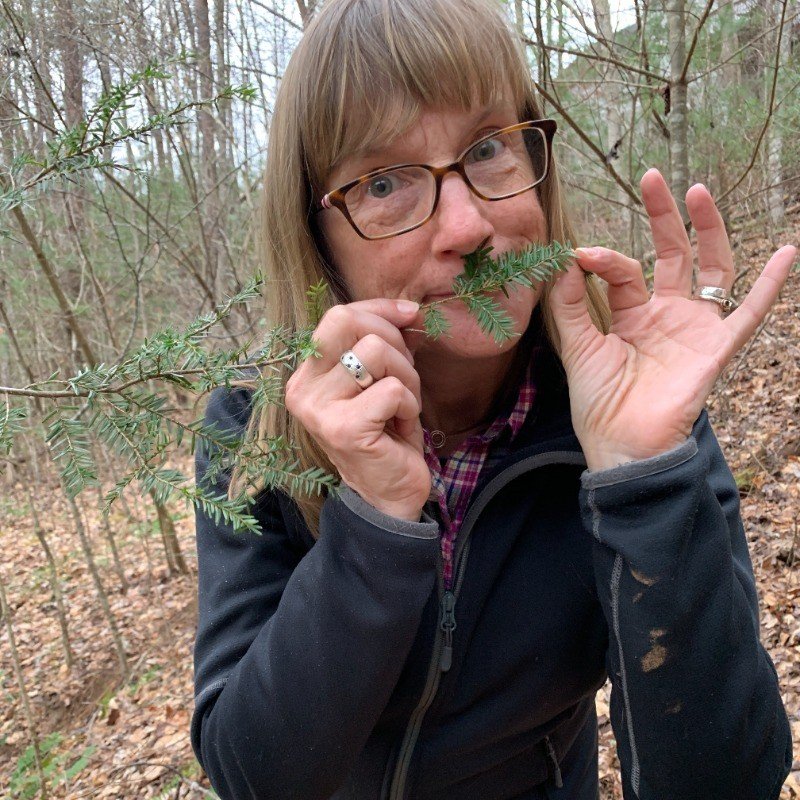

September 17 - October 20, 2024
ONLINE CLASSES: Tuesday evenings 6:30 - 8pm
(recorded for those who can’t attend live)
FIELD TRIPS: Sunday afternoons 12 - 5pm
Field Trip locations within 45 min drive from Sylva & Waynesville, NC
*The Field Trips for this course can also be attended a la carte for those who can’t commit to the entire series. To register for individual Field Trips, simply fill out the registration form, indicate which date(s) you’d like to attend, then donate whatever amount feels right!
Create & Re-Wild is a five-week introduction to the joyful and connective practice of nature journaling. By focusing our curious attention on the natural world and recording our observations through words and pictures we can forge a deeper relationship to the plants, animals, and other life around us. Through sit spot activities, inspiring prompts, and joyful group outings we will strengthen our naturalist skills, cultivate compassionate self awareness, and develop a deeper sense of reverence and wonder for the wild world.
Course Details & Logistics
(Please read in full before completing registration)
What is the Cost?
This course is offered on a sliding scale with a suggested donation of $100 - $250*. Donating at the upper end of this sliding scale helps ensure these programs remain accessible to those with less financial means. Please donate whatever amount feels accessible and reflective of the value you see in this program.
*No one will be turned away for lack of funds- if you are really excited to learn about nature journaling but can’t make a financial contribution that is perfectly fine! We especially encourage BIPOC, LGBTQ+, young people and other folks from marginalized communities to attend at whatever cost feels accessible. Wild Remembering would not be where we are today if not for the scholarships and financial support we have received from generous teachers and organizations.
Learn more about our philosophy of Gift Economy.
Who is this course for?
From complete beginners who believe they “aren’t artistic”, to passionate creatives looking to deepen their connection to the natural world. Wherever you may be on your nature journaling journey, this course is designed to be accessible, enriching, and supportive. As a participant you will choose your own path that best suits you and your schedule from a variety of interactive options. These include: an engaging online class for 5 weeks, field trips on the weekends, sit-spot activities, journal prompts, exploration and research of the natural beings in your space, and sketch/paint/art prompts and tutorials.
Where & when will the course take place?
ONLINE CLASSES
Five consecutive Tuesday evenings on Zoom, September 17 - October 15 from 6:30-8:00pm.
These sessions will be recorded for those who can’t attend live.
GROUP FIELD TRIPS
Five consecutive Sunday afternoons, September 22 - October 20 from 12:00-5:00pm.
Field Trips will take place at various locations near Sylva & Waynesville, NC, within 45 hour drive from each. Possible locations include Waterrock Knob, Richland Balsam, Sunburst, and Soco. Carpools will be available.
What if I’m not available to attend all of the Field Trips?
Don’t worry! You will not “fall behind” if you miss some of the Field Trips. Each outing will be designed to be fun and enriching for all, regardless of previous attendance.
On the registration form, please let us know which Field Trips you are likely to attend so we can plan accordingly.
Will there be homework?
In addition to the online classes and nature-based field trips, participants will be invited to complete optional nature journaling prompts, exploration of the natural beings in their personal spaces, and sketch/paint/art prompts and tutorials. To complete these and to get the most out of the course, participants will be encouraged to spend at least 15 minutes per day at their “nature sit spot” and use the natural journaling process to discover a deeper connection to the more than human world around them.
Beyond that it’s totally up to you! Some folks might choose to spend a couple of hours observing, journaling, sketching, and completing the weekly activities, while others might be contented with just a few minutes of watching nature unfold around them while they sip their morning coffee. It’s your choice!
What will I need?
Nature Journaling Supplies:
The following is a list of recommended supplies but you can also use whatever you have on hand. It is not essential that you have a giant or comprehensive set of art supplies, just enough to feel inspired and excited to create! Also don’t feel like you need to break the bank buying the highest quality supplies, student grade and dollar store supplies will work as well.
Notebook/Journal*- recommended size is 8.5” x 11” to allow plenty of room for notes and sketches. Lined or unlined, it is your preference. Spiral bound or hard bound is up to you.
*For field trips you can bring this notebook/journal or a small travel size (5.5”x 8” or 3.5”x 5.5”).
Pencils and pens- Some suggestions include a #2 pencil or 0.5 mechanical pencil and Uniball signo micro 207 or your favorite ball point pen.
Other Art supplies- We will be exploring different art styles using watercolor, colored pencils, and line drawing. A list of optional supplies for these mediums will be available to participants after registration. Loaner materials will also be available during field trips.
Appropriate clothing and footwear- Please check the weather forecast and dress accordingly for our field trips (and your sit spot!). Hiking shoes, warm layers and rain jackets are highly recommended even if the forecast looks clear and warm.
A sit pad or lightweight portable camp chair- Having something to sit on while taking notes or sketching will be helpful. We will have a few that folks can borrow.
Water and Snacks- Bring whatever you need to stay hydrated and sustained on our field trips. Hot tea or coffee flasks are lovely on cooler days in the fall.
Nature Field Guides and/or Smartphone Apps - Field guides are invaluable resources when getting acquainted with our local flora and fauna and we recommend picking up one or two that feel particularly inspiring. Check the library or used book store to see what is available before buying any new. Some recommended field guides include Reader’s Digest Guide to North American Wildlife (a pretty decent all-in-one illustrated natural history guide), Peterson’s Guides series (available for Birds, Mushrooms, Trees, Wildflowers, Mammals etc.), Audubon Guides, and region specific guides such as Trees of the Smokies, Wildflowers of the Smokies etc. Many great natural history apps are now available but wont replace a good field guide. We recommend Merlin (birds) and iNaturalist or Seek (for plants and fungi).
About Your Teachers
Debby Singleton is a certified Nature & Forest Therapy Guide, educator, experiential facilitator, and a multimedia artist who uses observation, creating, and journaling to connect with nature. She specializes in pen and watercolor mediums, but also dabbles in just about every source of creating. Primarily a landscape and wildlife artist, Debby captures the natural world on paper while adventuring and from her basement studio overlooking her holler near Cullowhee, NC. She is a firm believer that everyone is an “artist” and uses this mantra to help others find the JOY and the WELLNESS benefits of connecting art with nature. Debby is excited to share her love of nature journaling, writing, sketching, and exploration with everyone in this course.
Topher Stephens has been a leader of outdoor and experiential education programs for over 15 years. Drawing from his background in conservation biology, mindfulness education, and nature-based mentoring, he brings a reverence for all life and a deep respect for the more-than-human world to his teaching. He loves to sketch, watercolor, whittle, and write songs from sit spot on Caney Fork. He is super stoked to share his love of nature and creativity with passionate folks in his home community.










